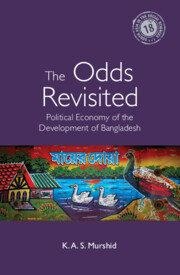Book contents
- Frontmatter
- Dedication
- Contents
- List of Tables and Figures
- Acknowledgements
- List of Abbreviations
- Introduction
- 1 A Bird’s-Eye View of the Bangladesh Economy: 1971–2020
- 2 Initial Conditions: The Odds Revisited
- 3 The Food Security Challenge
- 4 Exploring Transition and Change in the Rice Market
- 5 International Migration
- 6 The Rural Non-farm (RNF) Sector
- 7 Industrialization and the Rise of RMG
- 8 Industrialization: Other Stories
- 9 The Social Sector Puzzle
- 10 Dhaka: Capital Formation—Urbanization, Competition and the Rise of a Business Class
- Conclusion
- Notes
- Glossary
- References
- Index
4 - Exploring Transition and Change in the Rice Market
Published online by Cambridge University Press: 30 June 2022
- Frontmatter
- Dedication
- Contents
- List of Tables and Figures
- Acknowledgements
- List of Abbreviations
- Introduction
- 1 A Bird’s-Eye View of the Bangladesh Economy: 1971–2020
- 2 Initial Conditions: The Odds Revisited
- 3 The Food Security Challenge
- 4 Exploring Transition and Change in the Rice Market
- 5 International Migration
- 6 The Rural Non-farm (RNF) Sector
- 7 Industrialization and the Rise of RMG
- 8 Industrialization: Other Stories
- 9 The Social Sector Puzzle
- 10 Dhaka: Capital Formation—Urbanization, Competition and the Rise of a Business Class
- Conclusion
- Notes
- Glossary
- References
- Index
Summary
This chapter explores the question of how the large, complex paddy-rice market in Bangladesh was able to transform itself and evolve in the face of changing risks and incentives into a better-functioning market system. It notes significant but opposing trends over two decades in different areas, particularly in terms of market structure, trade circuits and exchange relations. Evidence of a sharp decline in tied transactions points to the growing importance of impersonal exchange. Underlying causes of these changes are explored with particular reference to microfinance, remittances, rural roads, mobile telephony and mobile financial services (MFS).
Much has changed in the rural economy in recent decades: the micro-credit revolution has matured, remittances have grown enormously, mobile phones have brought on an information revolution in the country and there have been major transformative changes in health, education, especially girls’ education, and physical infrastructure.
We explore the Bangladesh paddy-rice market, which has tended to be described variously as traditional, backward, complex, hierarchical, interlocked and exploitative, on the one hand, and well integrated, competitive and efficient on the other (Ravallion 1986, 1987; Baulch et al. 1998; Dawson and Dey 2002; Goletti, Ahmed and Farid 1995). In actual practice, the rice market displays elements of both aspects, with some backward areas associated with complex forms of tied exchange á la Crow and Murshid (CM henceforth) (1994), while other more advanced areas display a much more competitive outcome based on increasingly less personalized transactions.
The central message of this chapter is that the huge paddy-rice market is not static but is constantly changing, adapting and evolving into a better-functioning market system. In particular, the backward forms that have been well noted are in recession, and over the course of the last several decades various forms of tied finance have been dramatically reduced. It is suggested that the improvements in agricultural performance – especially in rice production and, broadly, in the rural socio-economic regime marked by exogenous developments in infrastructure, mobile telephony and MFS, and rural finance – have played a significant role in transforming rural markets.
- Type
- Chapter
- Information
- The Odds RevisitedPolitical Economy of the Development of Bangladesh, pp. 58 - 77Publisher: Cambridge University PressPrint publication year: 2022



